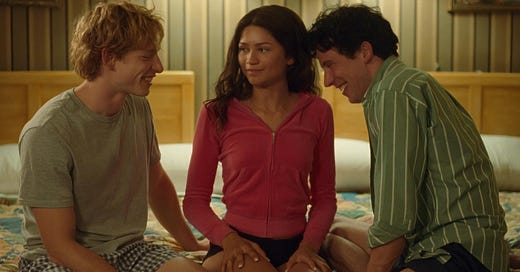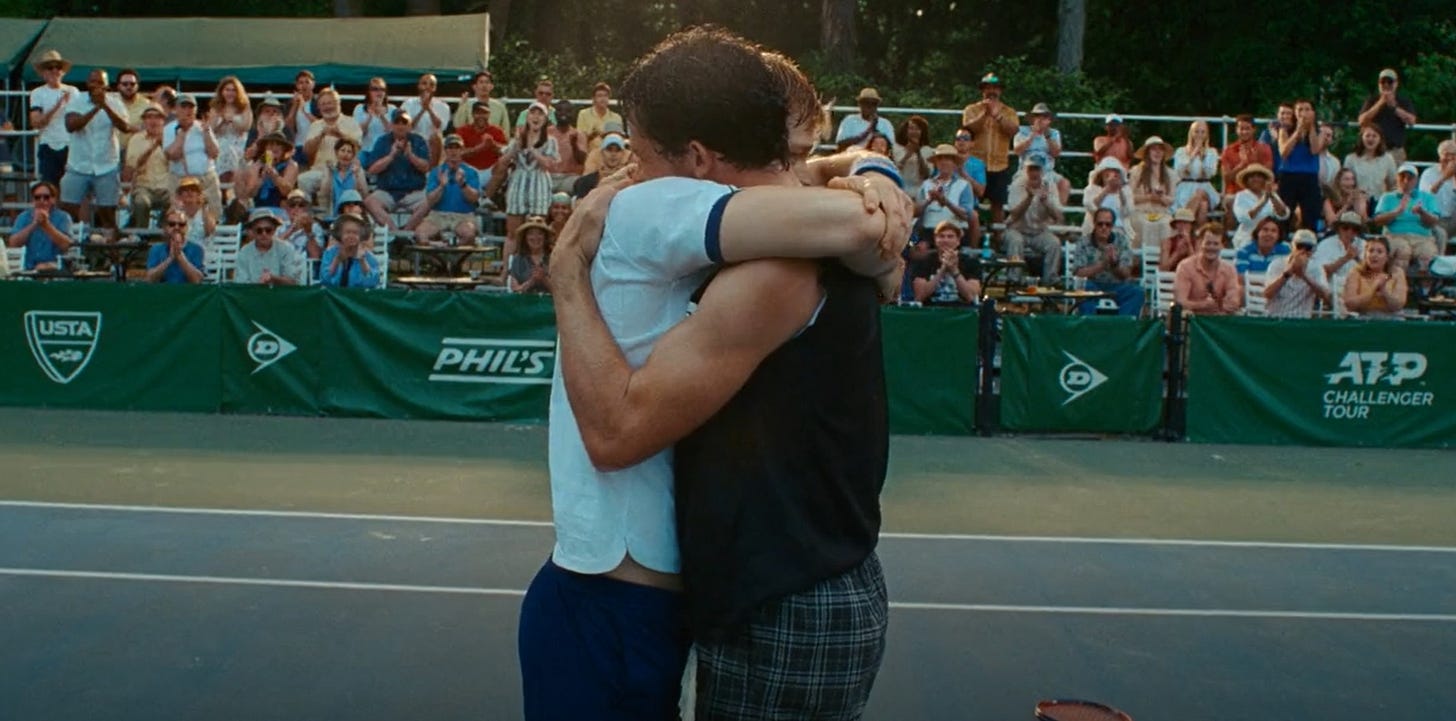Game, Set, Match
The ending of "Challengers" isn't so confusing once you see what the film is doing.
Having a six-year-old (about to turn seven) makes finding time to watch movies for grown-ups a little difficult. I’m more likely to have seen Migration or Super Mario Bros. than an adult drama nowadays, especially if it means leaving the house to go to a movie theater. It took me a few weeks to get around to seeing Challengers, director Luca Guadagnino’s drama about the love triangle between three professional tennis players, from an original screenplay by Justin Kuritzkes. Having read the reviews before seeing the film, I was prepared for what critics complained was a confusing and ambiguous ending, and I must admit that I don’t think I saw the same film they did. Was it open-ended? Sure. Was it unclear what was happening? Not at all.
(Note: This essay will discuss the ending to Challengers, so be forewarned.)
Challengers tells, in a series of flashbacks, the story of Art (Mike Faist) and Patrick (Josh O’Connor) who have been best friends since the age of twelve and compete together as teenagers in doubles tennis and as individuals, though Art finds doubles much more fun. One day they encounter Tashi (Zendaya), a college tennis star, at a tournament and both fall for her. Tashi drives a wedge between the two boys, manipulating them emotionally, sexually, and professionally over the years until they no longer speak to each other. Throughout this, both Art and Patrick convince themselves they desire Tashi. Tashi dates Patrick for a while but breaks up with him when he fails to submit to her ambitions. After an injury ends her career, Tashi takes on Art as her project, molding him into a great tennis star and her husband. However, he is unsatisfied and chafing under her control but unable to stand up to her. (She even uses the cudgel of his fame to insist on equally billing with him in ad campaigns.) Left by himself, Patrick’s career stalls and he plays minor tournaments for pocket change, using dating apps to cruise women (and men) he can sweet talk into a place to sleep. Things come to a head when Art and Patrick play each other for the first time in nearly a decade at a small-time tennis event, an encounter Tashi may or may not have intentionally arranged.
The end of the film finds Patrick confronting Art in a sauna, each wrapped in macho bluster and little else. Patrick tells Art he misses playing with him, but Art, echoing his wife’s words, tells Patrick he’s a loser and he doesn’t matter to anyone, least of all Art. Patrick also arranges a meeting with Tashi and convinces her that she should coach him for a final run at a Grand Slam title, appealing to her vanity that pulling off the comeback of an aging thirty-something would be a greater accomplishment than managing Art into his retirement. She sleeps with Patrick instead.
On the court, the events critics considered confusing occurred in the wake of these encounters, as Patrick and Art play each other to win a tournament that would give Patrick a chance to compete in the U.S. Open. As New York Times critic-at-large Wesley Morris said in a recent conversation about the ending with Times movie critic Alissa Wilkinson:
As tennis, this is a movie about whether Patrick can clean up his act to get back to the major tournaments — the U.S. Open, namely. Art’s in the main draw of the Open no matter what. But is that what he wants, to win more majors? Or does he want to win because Tashi wants him to? This is not a plot that can resolve that. But it also isn’t a movie that can resolve anything for itself. It doesn’t know what it wants. Tennis is a symbol (for sex) and a pretext (for relationships), but the movie does what tennis can’t: ends in a draw. That’s untenable.
That’s not at all what happens. Kuritzkes writes the ending more cleverly than that, using the final match to undo carefully and deliberately everything that came before. What we see is a series of reversals of the wedges Tashi drove between Art and Patrick until, at the end, they finally free themselves of her malign influence. It just doesn’t matter what the final score of the match is because Patrick and Art have stopped playing.
The first reversal we see comes when Tashi approaches Patrick with a plan for him to throw the match so Art can regain his confidence, a plan Patrick refuses, and the match ends with an unexpected reconciliation. This reverses a key moment in their teen years when Patrick agree to throw an important tournament match between him and Art so Art’s grandmother can see Art win before she dies. Tashi instead declares that whoever wins will get her phone number, prompting the two boys to become rivals instead of collaborators.
The next reversal we see comes when Patrick signals to Art that he, in the movie’s words, fucked Tashi. In the early days of their relationship, Tashi had forbidden Patrick from telling Art that they had had sex. Art encourages him to spill the beans nonverbally on the tennis by using a special serve, which Patrick does. The answer, however, hurts Art’s feelings because he had hoped Tashi would choose him. Now, unbidden, Patrick uses the same special serve with a sly smile, and Art gets the message. But this time he is not angry at Patrick but at his wife, who he finally realizes doesn’t care for him. Somehow—and this is indeed a bit underdeveloped—this leads Art to realize that he misses playing with Patrick more than he likes playing for Tashi. (I suppose this ties back to Patrick telling Art early on that Patrick’s “purpose” in sex isn’t committed relationships but for women to make mistakes with.) Art begins to smile, and the tenor of the match changes, becoming both more aggressive and also more playful, since both know each other so well they are an even match, communicating instinctively and nonverbally in ways neither had ever done—or could do—with Tashi.
This leads to another reversal. As teenagers, when Art expresses loyalty to someone, he does so by hurdling the net at center court instead of going around it to join the other person. He repeatedly jumps the net to join Tashi, symbolizing that he is on her side, most obviously when she injures her knee and he runs to her, too late to break her fall. (Similarly, Patrick expresses connection by crossing symbolic lines, as in a scene set in college when he uses his foot to pull Art’s stool closer to his.) Now, in the last volley we see played, he runs to the net, jumps in the air to slam the ball, and flies right over the net. Patrick drops his racket and catches Art to break his fall, forgetting about the game. The two young men are now on the same side of the court for the first time since they were eighteen.
Finally, we see the most important reversal of all, taking us back to the first night the boys met Tashi. That night, they invited Tashi back to their hotel room, and while waiting to see if she comes, we see the boys hanging out in the unclothed casual dishevelment of people completely comfortable with each other. She arrives and orchestrates a three-way make-out session from which she withdraws, leaving the boys unknowingly kissing each other while she watches with a diabolical smile. When they realize what happened, they are confused, and she saunters out of the room, but not before throwing an apple of discord between the boys, purposely pitting the best friends against each other in competition for her phone number. Now, however, she is the one who loses power. After Patrick catches Art, the two embrace, in tears, hugging tightly and reconciling fully. This time, the intimacy is their choice and independent of Tashi, who sits in the stands watching with annoyance. They are done playing against each other, and we return to where we were first introduced to their bond, as doubles teammates, hugging each other in victory. The final ambiguous note finds Tashi first expressing her anger that Patrick and Art have stopped playing and then transitioning into a cryptic smile. We are left to wonder if this was her plan or if she is amused that they have defied her.
Symbolically, Tashi is little more than a personification of Art’s and Patrick’s ambition, and it is no coincidence that they reconcile only at age thirty-one, when Art is ready to retire and Patrick knows his career is ending. With no ambitions left to divide them, they instead realize the value of deep, intimate friendship the otherwise coldly transactional world where Tashi thrives.
It’s understandable that GQ spent a whole article trying to decide how gay Challengers is, as though sex were the only goal of intimacy. But reading the New York Times discussion between Morris and Wilkinson, I was dumbfounded that both critics fixated on not knowing who won the tennis match, as though that were the point. “Leaving the match unfinished is sort of like leaving the characters suspended there forever, looping and pinging back and forth, the results always up for grabs,” Wilkinson said. So the fact that the movie ended with the estranged buddies hugging and crying in each other’s arms didn’t signal any sort of conclusion? Apparently not. They need one character to dominate, even though the characters repeatedly talk about being peers, equals, and upbraiding each other when they dispute it.
The critics, besotted with Zendaya and thus blind to Tashi’s nastiness, declare that she truly “won.” Morris claimed “that last shot is these two guys proving to [Tashi] that they want it. Whatever that ‘it’ turns out to be.” That’s the kind of analysis you get when you can’t see love except in orgasm, or joy outside of domination. Much like Guadagnino’s other recent works, such as Call Me By Your Name, We Are Who We Are, and Bones and All, the underlying message is about the value of deep and true human connection.







You missed your calling. You should be doing film reviews.